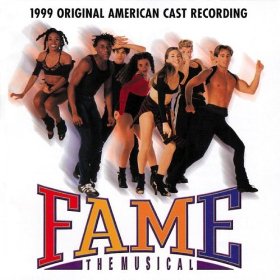 By Jae-Ha Kim
By Jae-Ha Kim
Chicago Sun-Times
January 26, 2000
“You must be in touch with your emotions if you expect to touch others,” a teacher says early on in “Fame–the Musical.”
Too bad the writers of the play didn’t follow this advice.
The play, which opened Tuesday night at the Chicago Theatre, wasn’t much of an improvement from the production that rolled into town last year. Full of cliches and stereotypes, the musical lacked memorable, well, music.
The play follows the class of 1984 from their freshman year to graduation at New York’s legendary High School of Performing Arts. There’s Carmen (Natasha Neary), the sexy Hispanic singer-dancer; Tyrone (James T. Lane), the illiterate, angry young black man; and Schlomo (Carl Tramon), a nebbish Jewish violin prodigy.
There’s also a chubby girl who’s on a “see food diet” (just how old is that joke, anyhow?), and a dance instructor who spews out such nonsense as, “Artists are special.” (Yes, but what about dilettantes?)
These caricatures could’ve worked had there been at least one standout musical moment. For instance, “Memory” almost makes you forget how lame “Cats” really is. And “Don’t Cry for Me, Argentina” makes even the most stubborn theatergoers choke up at least a little during “Evita.”
“Fame” has a song, too–the highly catchy title track number with the explosive chorus.
Or so you’d think.
But without an exceptional singer like Irene Cara–who sang the tune in the film version–the song falls flat.
Natasha Neary is a fiery dancer and a sexy performer. But she doesn’t have the range to make that song soar–especially with the tepid arrangement with which she is given to work.
As Carmen, the student most hungry for fame, Neary is a charismatic performer who owns the stage when she’s dancing. Never mind that she, like the other actors, aren’t convincing as 18-year-olds, much less the 15-year-olds they portray at the start of the musical. Her moves are feral as she stalks the stage like a panther.
Too bad Amy Erlich wasn’t given more of a chance to showcase her singing. Playing tough-talking drummer Grace, Erlich was a scene-stealer in her few moments onstage and her bits singing with the ensemble.
Though the actors aren’t given much material to work with, their world is magnificent in its simplistic reality. Sure, the graffiti’d walls are a tad much. But the gritty interior of the school is right on the money.
So, too, are the tacky clothes the kids wear. Garbed in stonewashed jeans and ugly ruffled skirts, the actors are dressed like real teenagers, unlike the WB cast members who seem to shop at Versace.